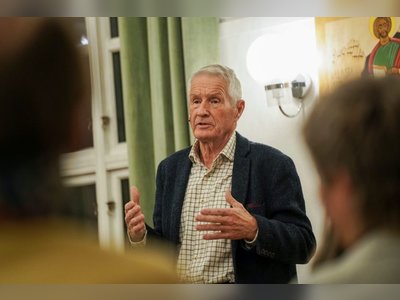The four other times the Queen has addressed the nation
The Queen's televised address to the nation on Sunday night, in response to the coronavirus crisis, is only the fifth time the monarch has given such a speech in her 68-year reign.
While her Christmas Day message is an annual event, only rarely has she made rallying speeches at key moments in the life of the nation - predominantly at times of crisis and grief.
Now at a time when the UK faces what the prime minister has described as the ''worst public health crisis for a generation", the Queen is addressing the nation again.
So when were the four times the Queen previously addressed the nation in this way, and why?
Queen's Diamond Jubilee message, June 2012
The Queen's televised speech at the time of her Diamond Jubilee marked a moment of celebration. In the speech, which was broadcast around the world, she said she was "deeply touched" to see so many people celebrating the 60th anniversary of her accession to the throne. She said then that she hoped memories of the happy events that took place across the UK to mark the occasion would "brighten lives for many years to come".
On the death of the Queen Mother, April 2002
A decade before, the Queen had chosen to specially address the nation on the eve of her mother's funeral in 2002.
She said she had been deeply moved by the outpouring of affection, following the death of her "beloved mother" at the age of 101. In her speech, the Queen said she hoped the funeral would be a chance for thanksgiving, not just of her mother's life, but the times she had lived in. She described it as "a century for this country and the Commonwealth, not without its trials and sorrow, but also one of extraordinary progress, full of examples of courage and service, as well as fun and laughter".
On the death of Diana, Princess of Wales, September 1997
The Queen also addressed the nation on the eve of the funeral of Diana, Princess of Wales. While other special addresses have been pre-recorded, this was broadcast live to the nation from the balcony at Buckingham Palace. Outside and clearly visible behind the Queen were crowds of thousands who had gathered outside the palace gates to lay flowers and pay tribute.
The Queen's broadcast came after she returned to London from Balmoral, in Scotland, where she had been with her grandsons, William and Harry, after the sudden death of their mother in a car crash in Paris.
The language the Queen used in the broadcast was deeply personal. She said she was speaking "from the heart" as "your Queen and as a grandmother". She paid a personal tribute to Diana, saying she had been an "exceptional and gifted human being" and that she "admired and respected her for her energy and commitment to others and especially for her devotion to her two boys".
Her speech reflected on the "extraordinary and moving reaction" to Diana's death which saw many thousands of people pay their respects, laying flowers and tributes. The Queen said the funeral was an opportunity to express grief over Diana's death and gratitude for her life, while also providing an opportunity to "show to the whole world the British nation united in grief and respect".
At the time of the first Gulf War, February 1991
The Queen made a statement at the beginning of the land war in Iraq on 24 February 1991. She spoke then of the nation's pride in its armed forces and her hope that the nation would unite and pray for a "swift" success. She said she hoped this could be achieved with "as small a cost in human life and suffering as possible," adding that "then may the true reward of their courage be granted, a just and lasting peace."
In making her addresses to the nation she has followed in the footsteps of her father King George VI, who took to the wireless on 3 September 1939 to make his historic speech to those listening at home and abroad at the start of World War Two.
Speaking about the necessity of war, he said: "For the sake of all that we ourselves hold dear and of the world order and peace, it is unthinkable that we should refuse to meet the challenge."
She warned that the task would be hard and that there would be "dark days ahead", adding that war could "no longer be confined to the battlefield."














